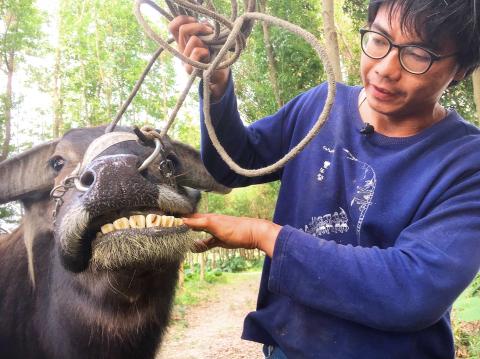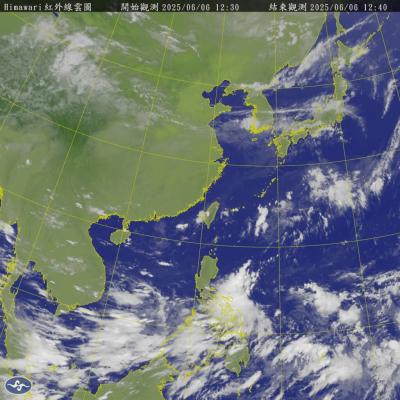A Changhua farmer who said on social media that he wanted to buy a water buffalo that was scheduled for slaughter, but did not have the money, received help from a farming organization.
Farmer Kao I-hsin (高一鑫) heard about the unwanted water buffalo in Yunlin County that was going to be slaughtered, but did not have NT$90,000 to buy the animal.
The Taiwan Ox Culture Association saw Kao’s post and purchased the buffalo for him to work on his farm.

Photo: Yen Hung-chun, Taipei Times
Kao said the buffalo, who is about six or seven years old, is the ideal age for farm work.
The original owner told Kao that the buffalo was “well trained, docile and strong,” adding that he regretted having to sell the animal, but he was too old to care for it.
Water buffaloes eat about 50kg to 60kg of food per day.
The original owner hoped to get rid of the animal as quickly as possible, Kao said, adding that he sold it to an ox trader in Yunlin’s Tuku Township (土庫).
The trader, who was unable to find a buyer, was preparing to sell the buffalo to a butcher who would slaughter it for meat, Kao said.
Kao said he feels very fortunate that the association, which was established two years ago in Hsinchu’s Sinpu Township (新埔) to help farmers who work with oxen, helped him save the animal from slaughter.
Association director-general Lee Chun-hsin (李春信) said he hopes to promote the use of water buffaloes on farms and has opened a school to train farmers.
“Machines have largely replaced water buffaloes on farms,” Lee said. “The culture and knowledge about their use is being lost.”
Kao, a Providence University Department of Business Administration graduate, said the main reason water buffaloes are used less on farms is because they are so difficult to train.
“The number of older farmers who are skilled in steering oxen has also dwindled, making it difficult to find suitable trainers for new farmers,” he said.
Kao said he is promoting the use of water buffaloes in Changhua County and that he hopes this farming tradition will not disappear.

STAY AWAY: An official said people should avoid disturbing snakes, as most do not actively attack humans, but would react defensively if threatened Taitung County authorities yesterday urged the public to stay vigilant and avoid disturbing snakes in the wild, following five reported snakebite cases in the county so far this year. Taitung County Fire Department secretary Lin Chien-cheng (林建誠) said two of the cases were in Donghe Township (東河) and involved the Taiwan habus, one person was bit by a Chinese pit viper near the South Link Railway and the remaining two were caused by unidentified snakes. He advised residents near fields to be cautious of snakes hiding in shady indoor areas, especially when entering or leaving their homes at night. In case of a

A tropical disturbance off the southeastern coast of the Philippines might become the first typhoon of the western Pacific typhoon season, the Central Weather Administration (CWA) said. The system lacks a visible center and how it would develop is only likely to become clear on Sunday or Monday, the CWA said, adding that it was not yet possible to forecast the potential typhoon's effect on Taiwan. The American Meteorological Society defines a tropical disturbance as a system made up of showers and thunderstorms that lasts for at least 24 hours and does not have closed wind circulation.

ENERGY RESILIENCE: Although Alaska is open for investments, Taiwan is sourcing its gas from the Middle East, and the sea routes carry risks, Ho Cheng-hui said US government officials’ high-profile reception of a Taiwanese representative at the Alaska Sustainable Energy Conference indicated the emergence of an Indo-Pacific energy resilience alliance, an academic said. Presidential Office Secretary-General Pan Men-an (潘孟安) attended the conference in Alaska on Thursday last week at the invitation of the US government. Pan visited oil and gas facilities with senior US officials, including US Secretary of the Interior Doug Burgum, US Secretary of Energy Chris Wright, Alaska Governor Mike Dunleavy and US Senator Daniel Sullivan. Pan attending the conference on behalf of President William Lai (賴清德) shows a significant elevation in diplomatic representation,

Credit departments of farmers’ and fishers’ associations blocked a total of more than NT$180 million (US$6.01 million) from being lost to scams last year, National Police Agency (NPA) data showed. The Agricultural Finance Agency (AFA) said last week that staff of farmers’ and fishers’ associations’ credit departments are required to implement fraud prevention measures when they serve clients at the counter. They would ask clients about personal financial management activities whenever they suspect there might be a fraud situation, and would immediately report the incident to local authorities, which would send police officers to the site to help, it said. NPA data showed